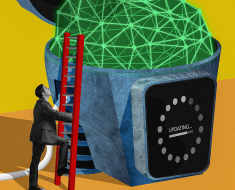Given the ability of generative artificial intelligence to use human input in creating text, images and other forms of media, the introduction of ChatGPT and other forms of generative AI immediately led to speculation that such technology would render many jobs obsolete. While those fears have yet to be realized on a large scale, one real possibility is that increased use of artificial intelligence may actually create a variety of new jobs.
“Artificial intelligence has made a very big impact. The people who are currently working with AI and a very similar area, called ‘machine learning,’ will be seeing a very big demand [for their services],” says Anna Koufakou, associate professor of software engineering at Florida Gulf Coast University. “Similar professions are data scientists or anybody who works with data analysis or business analytics. They will be more in demand and … since new things are coming out all the time, that will create sub-fields or sub-areas for this profession. But people need to know how to work with AI to operate it or train it in order to do certain things, so prompt engineers are (also) very much in demand.”
Though ChatGPT and similar forms of AI are easy to use for simple requests, Koufakou noted that businesses wishing to incorporate artificial intelligence into their operations will likely need to create new jobs, as well. However, as every business has different needs, she suggested consulting with existing IT personnel to first gain an understanding of how to best integrate artificial intelligence into their workflow.
“[A business owner] would need to look at the people who are working with their website or their applications and ask them how they can get AI to work with different things. A lot of this has to do with programming or web development, so they could probably start there,” she says. “If [a company] does hire any kind of consultants, they would definitely need to look at things like security or data issues that could come up because of their use of different AI tools.”
 Though many experts believe artificial intelligence is still in its infancy, security threats from malicious use of AI are already on the increase. The ability to rapidly create new forms of malware, ransomware, online scams and fake identities is also creating immediate demand for specialized cybersecurity professionals.
Though many experts believe artificial intelligence is still in its infancy, security threats from malicious use of AI are already on the increase. The ability to rapidly create new forms of malware, ransomware, online scams and fake identities is also creating immediate demand for specialized cybersecurity professionals.
“We’re already starting to see different types of AI utilized for attacks. I think the biggest one that we’re worried about is intelligent worms—malware that can go in and have a direction set into it, so when it gets into an organization, it knows where to go to grab that data,” says John Schlager, CEO and co-founder of Inceptus, a Cyber as a Service, or CaaS, company in Cape Coral. “For us, hiring the right people to have eyes on glass is an important part of our defense strategy. That’s key, since only humans can recognize and react to the anomalies created with AI.”
Though new online threats created by AI are creating jobs at cybersecurity firms, Schlager said it may be a while before human jobs are eliminated by the integration of AI. Some jobs may be lost, he said, but as more business owners begin to understand what it can do for their company, artificial intelligence may ultimately create or upskill as many jobs as it replaces.
“You know your business more than an AI model does, so figuring out a way to utilize it to better your business is probably the key,” Schlager says. “Look at your business and see what kind of processes you have, what kind of workflows there are and what kind of people that you need to do those jobs. A lot of those jobs are going to dissolve. But, while they might be a different quality or caliber, AI is going to create a lot of jobs, too.”


![[2302.04062] Machine Learning for Synthetic Data Generation: A Review [2302.04062] Machine Learning for Synthetic Data Generation: A Review](https://aigumbo.com/wp-content/uploads/2023/12/arxiv-logo-fb-235x190.png)

